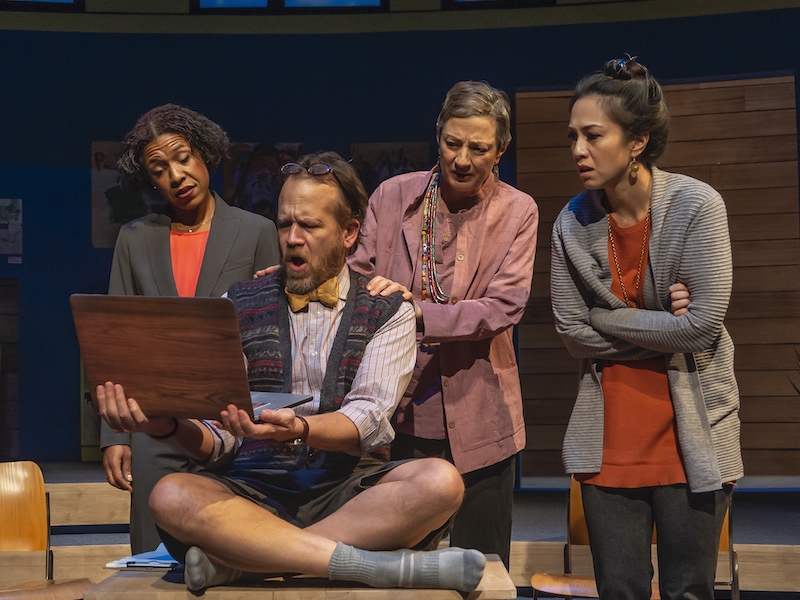There’s no doubt about it. Eureka Day is a very funny play.
The show, now having its DC debut at Mosaic Theater, features five perfectly-attuned actors, a director who understands comedy, a script that generates laughter, and a surprise ending.

It’s also a satire about open-mindedness, and proof that the path to hell is often paved with good intentions.
Set in Berkeley, CA, the play — which won every award in the region when it opened on the west coast last year — is about a private institution that tries to downplay its exclusiveness by calling itself a ‘community school.’ Its parent body is militantly progressive, committed to consensus and dubious about science.
The plot is set in motion by a sudden outbreak of the mumps. The latter — in case you’ve forgotten — is a benign-sounding disease that should have been eliminated a long time ago.
Unfortunately, this illness — like measles, chickenpox, and other childhood killers — has come roaring back, thanks largely to otherwise intelligent people who believe that science is a hoax and that vaccination is more dangerous than the diseases it prevents.
Eureka Day is the name of the school, and the five actors represent the members of the school’s executive board, who convene periodically, inside a classroom, to discuss issues. One topic of discussion is the school’s application form. Another is whether all children must be vaccinated.
The de facto leader of the group is Don (Sum Lunay), a Boho parent who reads poetry aloud and loves fund-raising. Eli (Elan Zafir) is a multi-millionaire who, as a stay-at-home dad, can attend school meetings and play around. Meiko (Regina Aquino) is the acquiescent single mother.
The other two are Suzanne (Lise Bruneau) and Carina (Erica Chamblee). Suzanne, a founder of the school, is the epitome of arrogance. The newcomer — seemingly at the other end of the spectrum — is Carina (Erica Chamblee), the only African-American on the board. (Her initial willingness to defer to the others is belied by the look of total disbelief on her face.)
In Eureka Day, the politically correct believe themselves to be above scientific proof. Worse yet, they believe that the freedom of the individual is more important than the safety of the group. It’s a case of ‘non-judgmentalism’ turned lethal.

But this is a comedy. And the funniest scene in the play is a parents’ meeting, conducted on Facebook, at the end of Act One. The leaders are trying to find consensus. But the parents are totally undisciplined. Participation descends into farcical behavior as comments — posted on a screen above the performers — drown out any semblance of reason.
At the performance I attended, the audience howled with laughter as each new comment popped up on the screen. During the intermission, people talked about the craziness of a world in which facts are irrelevant, opinion rules and everyone has an equal say.
Curious to hear how all this came about, I called Spector, who was in California, and asked him, point blank, how the anti-vac movement could have taken root among educated people.
The playwright, it turned out, was just as surprised as I was. “This is an area,” he said, referring to Oakland, where he now lives, “with a high rate of anti-vac people.”
That, he pointed out, is strange, since the same people who reject vaccines are willing to accept the scientific proof when it comes to climate change and other issues.
“I find the anti-vac movement to be prevalent on both the right and the left,” he said. “That’s what makes it so interesting dramatically.”
According to Spector, many of the “hot spots” for vaccine resistance are along the Pacific Coast, among people who are wealthy and well-educated, like some of the characters in the play.
“These are people with a profound distrust of the pharmaceutical industry,” he explained. “They know about the opioid epidemic. They know about the lies they were told about the drugs being ‘safe.’ So they are very suspicious.”
More startling, he continued, is the fact that some people believe they are exempt from public health rules. “These are people of social or economic privilege, people who believe that they should not have to risk their children for the good of others,” he said.
“Eureka Day is not about vaccination,” he pointed out. “It is about the individual versus society.”
This dichotomy, according to Spector, is more problematic today than when he started to write the play in 2016. He was more optimistic then. Now he’s less hopeful.
“It’s a reflection on politics, and the precarious nature of democracy. In the 18th century, reasonable people were able to agree on what constituted the common good. There has been a subversion of that idea, which is reflected in the play,” he said.
Although Eureka Day is Spector’s third full-length play, it is his first to be produced in DC. (He had two 10-minute plays staged at the Source a few years ago.)
Choosing Mosaic for this production was easy. “Twenty years ago, when I was at college, I did an internship under Ari Roth at Theater J. So this was a natural choice. ”
Roth, who is now in his fifth season as Founding Artistic Director of Mosaic, happens to be a strong believer in matching directors with playwrights.
He put Spector in touch with Serge Seiden, the theater’s managing director, and the two connected last year. I asked Seiden to fill me in.
“My first meeting with Spector was like an audition. We agreed on everything. I felt very excited to be able to direct this play myself,” he said, adding that he has a strong taste for comedy.
Working on Bad Jews at Studio Theatre several years ago, and then Hooded at Mosaic in 2017, gave him a lot of experience at working with the kind of humor that comes with a sharp edge.
“Eureka Day is a comedy of manners,” Seiden explained. “It’s a specific kind of comedy, common during the Restoration, that’s based on poking fun. Think of it as satire of a particular group of puffed up characters with foibles. It’s the foibles that make the play relevant.”
One of the challenges of producing the show at Mosaic was that the theater itself is so different from the two preceding it.
According to Seiden, the West Coast premiere was in a theater much smaller than Mosaic, though traditional in style. The New York debut was in a tiny black box studio in Tribeca, with 70 seats, while at Mosaic, the theater has 260 seats with a huge proscenium stage.
And the actors, of course, are very different, each with his or her interpretation of the role. “The actors bring a delicious quality to the play, which makes them almost unrecognizable from their predecessors,” Seiden said. “Interestingly, every one of them is a parent.”
Before the show opened, Mosaic hosted a pizza party for the cast, and all the actors brought their children. The sound designer, David Lamont Wilson, recorded the kids singing and doing pre-show announcements, and those voices are now part of the show.
The art on the walls of the set — a well-equipped classroom designed by Andrew Cohen — was all produced by the actors’ children. (Seiden’s 16-year-old son did not attend the party or sing, but he did contribute a brightly colored drawing.)
As for the playwright’s daughter, who is four — she was back in California, and so did not attend the party or contribute to the singing or the classroom art.
However, she is vaccinated.
Running Time: Two hours, including one intermission.
Eureka Day plays through January 5, 2020, at the Mosaic Theater, located inside the Atlas Performing Arts Center, 1333 H Street NE, Washington DC. For tickets, call (202) 399-7993, extension 2 or go online.
Related:
Bob Ashby’s Review: Mosaic Theaters ‘Eureka Day’ puts immunization in the hot seat
John Stoltenberg’s Column: At Mosaic’s ‘Eureka Day’ a class of laughs and spats is in session




